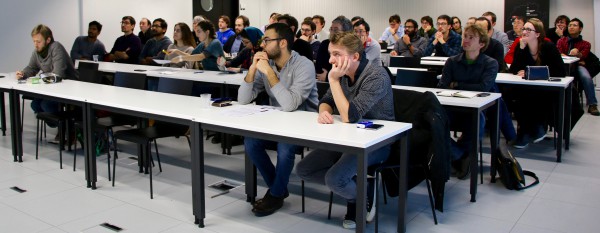MARVEL Junior Seminar — June 2020
Zoom meeting link:
https://epfl.zoom.us/j/93881551248
Password: 3417
The MARVEL Junior Seminars aim to intensify interactions between the MARVEL Junior scientists belonging to different research groups.
Each seminar consists of two presentations of 25 minutes each, allowing to present on a scientific question in depth, followed by time for discussion. The discussion is facilitated and timed by the chair.

MARVEL Junior Seminar Organizing Committee — Giuliana Materzanini, Stefano Falletta, Olga Syzgantseva, Maria Fumanal, Markus Stricker, Kristians Cernevics, Max Veit and Patrick Mayor
Talk 1 — Ab initio modeling of thermal transport through van der Waals materials
Sara Fiore, Mathieu Luisier
Integrated Systems Laboratory, ETHZ
We have developed an advanced modeling approach to shed light on the thermal transport properties through van der Waals Materials (vdWM) made of two transition metal dichalcogenide (TMD) monolayers with partial overlap. The latter structures could play an important role in several applications, going from next-generation transistors to ultra-scaled optical devices, provided that the heat flowing through them can be efficiently controlled. In our simulations, thermal transport is computed at the quantum mechanical level, in the ballistic limit, by combining dynamical matrices from first-principles and the Non-equilibrium Green's Function formalism.
Phonons are injected into one of the TMDs and collected in the other. Since only phonons occupying states available through the whole structure can be transmitted, the heat transferred through partially overlapping homo- or hetero-bilayers is reduced as compared to a single monolayer of one type or the other.
This behavior is observed when both different and identical TMDs form the vdWM of interest. Our work emphasizes the possibility of engineering the heat flowing through nanostructures by combining TMDs monolayers exhibiting different thermal properties.
Talk 2 — TDDFT for X-ray absorption spectroscopy: efficient implementation and GW corrections
Augustin Bussy, Jürg Hutter
Department of Chemistry, University of Zurich
X-ray absorption spectroscopy (XAS) is a popular tool to probe the local geometric and electronic structure of matter. To complement measurements, calculations based on methods such as time-dependent density functional theory (TDDFT) are usually needed.
Therefore, we recently implemented a new TDDFT based XAS simulation method in the CP2K software package. The method exploits the localized nature of core electronic states and Gaussian basis sets by using a restricted resolution of the identity (RI) scheme, allowing for efficient calculation of large and periodic systems.
XAS TDDFT correctly reproduces the spacing and relative intensities of experimental spectral features, but absolute energies are off. To match experiments, the spectrum is usually rigidly shifted, either empirically or based on some separate ΔSCF calculation. We tackle this problem differently and propose an integrated fully ab-initio GW correction scheme that leverages the same efficient RI approach as the base TDDFT calculation.
Check the list of the next MARVEL Junior Seminars here.
Low-volume newsletters, targeted to the scientific and industrial communities.
Subscribe to our newsletter